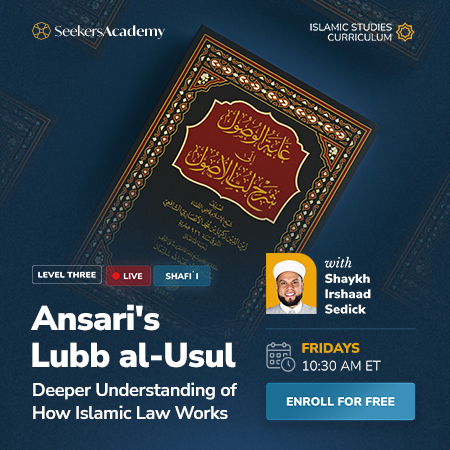
Lubb Al-Usul is traditionally considered as an intermediate to advanced level of study, and has, therefore, been included in our level three curriculum.
Shaykh Al-Islam Zakariyya al-Ansari was a leading Islamic scholar of the 15th century, who specialized in Shafi‘i Fiqh, Usul Al-Fiqh, and Tasawwuf. He was born in or around 1420 CE, in Sunaika, located in the Egyptian province of Sharqiyya. During his adolescence, al- Ansārī moved to Cairo to study at al-Azhar University. Al- Ansārī studied under al-Qāyāti, Ibn Hajar al-Asqalāni, Jalāl al-Dīn al Mahallī and Sharaf al-Din al Munawi.
Some of Ansari's most famous works include: Manhaj al-Tullab , Fath al-Wahhab , Tuhfat al-Tullab, Lubb al-Usul, it's Commentary - Ghayat al-Wusul, and his commentary on al-Qushairī's Risāla fī ‘l-tasawwuf.
Lubb al-Usul is a classical work on intermediate Shafi‘i Usul al-Fiqh and, therefore, forms part of traditional Shafi‘i syllabuses across the Muslim world.
The objective of this study is to understand Sacred Law in greater detail by expanding upon the basic concepts covered in earlier levels. Once a student can grasp the internal framework of Legal Theory (Usul Al-Fiqh) upon which Sacred Law is based, they will develop a deeper appreciation and understanding of Sacred Law.
This is an intermediate-level class in Shafi’i fiqh (Level Three). It is therefore essential for students to have completed the study of Imam Haramayn’s Waraqat or its equivalent.
This course will assist the student to understand common Sacred Law nomenclature as well as how the Mujtahid arrives at the detailed rulings of Sacred Law.
- Teacher: Mawlana Irshaad Sedick
This important text, Lubb Al-Usul, along with its Commentary, Ghayat Al-Wusul, also by Shaykh Al-Islam Zakariyya Al-Ansari, comprehensively covers the entire spectrum of Shafi‘i Usul Al-Fiqh. Usul Al-Fiqh or Legal Theory comprises the study of the sources of Sacred Law, the methodology of extrapolating the law from its sources, and details about the Mujtahid.
The concise work, Lubb Al-Usul, facilitates a comprehensive coverage of key concepts and details before venturing into larger voluminous works. The course text is highly recommended by traditional Shafi‘i Scholars and institutions for intermediate to advanced students and is well-placed after a study of Al-Waraqat by Imam Al-Haramayn. The main commentary of Lubb Al-Usul is the author’s own, Ghayat Al-Wusul ila Sharh Lubb Al-Usul.
- This course is for ages 18-100.
- It is particularly beneficial for Students of the Shafi‘i School.
- It is a Level Three course. In order to successfully complete this course, students should first complete Usul al-Fiqh: How Islamic Law is Derived and Interpreted: Juwayni's Waraqat.
- This course can also be taken by anyone who is interested in learning more about the systematic thinking and methodology of traditional Mujtahids.
- Understand the full spectrum of concepts within the subject of Usul Al-Fiqh (Legal Theory).
- Understand the framework upon which Sacred Law (Fiqh) is based.
- Understand the methodology of the Mujtahidun in deriving detailed Fiqh rulings.
- Analyze concepts within Fiqh in light of the framework of Usul Al-Fiqh
- Understand how the sources of Sacred Law can present solutions to all current and future novel situations that Muslims may face.